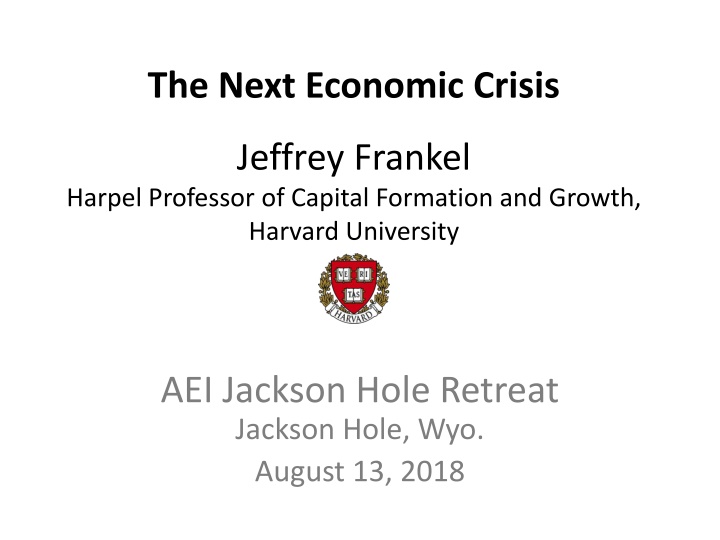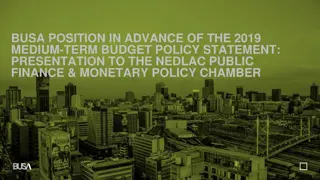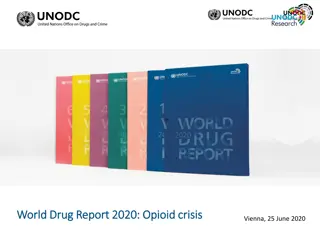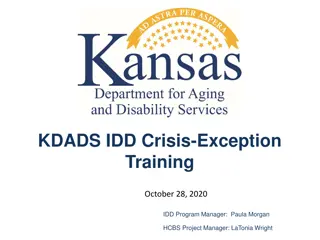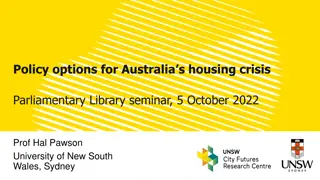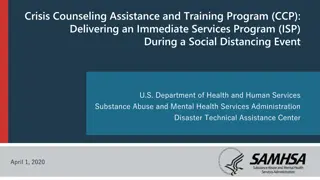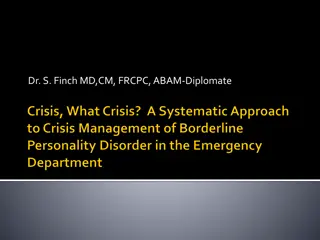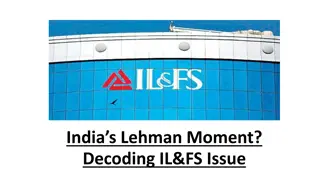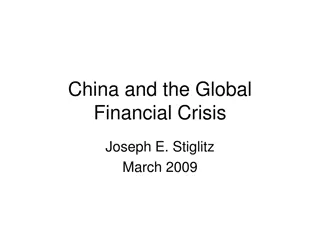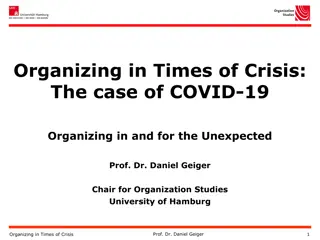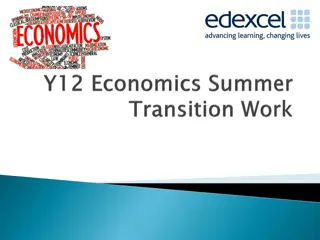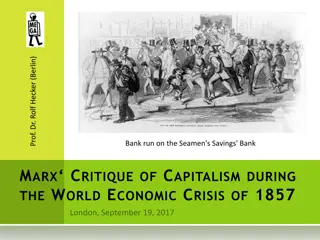Concerns Over the Next Economic Crisis and Policy Challenges Ahead
The concern over a potential severe recession is growing due to high stock market valuations, global corporate debt levels, and pro-cyclical policies in place. The current fiscal expansion without regard to counter-cyclical measures raises worries about the lack of fiscal space to respond effectively to the downturn. The timing and nature of policy adjustments are crucial to mitigate the impact of the upcoming economic challenges.
Download Presentation

Please find below an Image/Link to download the presentation.
The content on the website is provided AS IS for your information and personal use only. It may not be sold, licensed, or shared on other websites without obtaining consent from the author.If you encounter any issues during the download, it is possible that the publisher has removed the file from their server.
You are allowed to download the files provided on this website for personal or commercial use, subject to the condition that they are used lawfully. All files are the property of their respective owners.
The content on the website is provided AS IS for your information and personal use only. It may not be sold, licensed, or shared on other websites without obtaining consent from the author.
E N D
Presentation Transcript
The Next Economic Crisis Jeffrey Frankel Harpel Professor of Capital Formation and Growth, Harvard University AEI Jackson Hole Retreat Jackson Hole, Wyo. August 13, 2018
The economic statistics have been good. The expansion has been long-lived. If it continues another year, it will equal the record 10-year expansion in the 1990s. Unemployment is low 3.9% in July, as low as in 2000. GDP growth has been relatively strong: BEA estimated 2nd-Q 2018 growth at 4.1%, the highest quarter since 4.9% in 2014. But sooner or later there will be a new recession. I worry that when it comes, it will be severe.
What could set off a downturn in the coming years? One possibility: Because the US stock market is high, historically, e.g., by the CAPE ratio, and global corporate debt is also high, historically, a negative shock could send securities tumbling. What sort of shock? A return of inflation is one good candidate. Trade war escalation is another.
Why do I worry the next recession could be severe? Because policy is currently pro-cyclical rather than counter-cyclical. Admittedly it is hard to get counter-cyclical timing right; but that is no excuse for adopting pro-cyclical policy. (1) Especially fiscal policy; (2) But also macro-prudential policy; (3) And perhaps even monetary policy.
(1) Pro-cyclical fiscal policy We are now undergoing the most radically pro-cyclical fiscal expansion since WWII => budget deficit > $1 tr. by 2020 (CBO): Tax cuts Corporate tax reform was needed. But should have been revenue-neutral Rapid spending increases. When the next recession comes, we won t have fiscal space to respond, having already used up our ammunition. Such destabilizing fiscal policy is traditional in developing countries, exacerbating their booms & busts. Well-documented, e.g., by Kaminsky, Reinhart & V gh (2005). Another reason, besides cyclical timing, why this is an especially bad time to push up the budget deficit: The retirement of the baby boom generation means that big deficits in Social security and Medicare are coming.
Fiscal policy, continued Usually taxes fall & govt. spending rises in response to recessions. Now, for the 1st time since WWII,fiscal policy has turned strongly expansionary at a time of full employment. Budget deficit (% GDP) Unemployment Data source: Bloomberg 6 This is how the world s biggest economy goes broke Tama Churchouse, Feb.26, 2018. www.stansburychurchouse.com
(2) Pro-cyclical financial regulation The wrong way to do it: relaxing financial regulation at the height of financial booms and then tightening it in response to financial crashes. Exacerbates the swings. Other countries do this better. E.g. Asians macroprudential policy is countercyclical: They raise bank reserve requirements and tighten homeowners loan-to-value ceilings in a boom, and loosen them when there is a financial downturn, rather than the other way around. (See appendix.)
(3) Even pro-cyclical monetary policy? In past recessions, the Fed has responded by cutting interest rates around 500 basis points, helping to moderate those recessions. But it won t be able to do it next time, if interest rates at the peak are only 200 basis points. President Trump says he is not thrilled (July 19) about Fed s interest rate rises, despite low unemployment. Martin Feldstein favors more Fed tightening. July 26 in the WSJ: raising the rate when the economy is strong will give the Fed room to respond in the next economic downturn with a significant reduction .
Monetary policy The Fed responded to each of the last 3 recessions by cutting the interest rate more than 500 basis points. Next time? Data source: FRB US Economics Analyst: From ZLB to ELB , GS, Feb. 26, 2016.
As I put it before the last recession: The future downturn is likely to be far worse than the recent one It is impossible to say when the next recession will come. But when it does, it is likely to be worse Why? Precisely because we will enter it at a time when the budget deficit and national debt are already alarmingly high. Thus when the next recession hits, we will not have luxury of being able to cut taxes and increase spending "A Debate on the Deficit," The Means to Prosperity: Fiscal Policy Reconsidered, P.G.Berglund & M.Vernengo, eds. (Routledge, 2005). Also The Forward, 11/19/2003; Cato Journal, Summer 2007; WSJ 1/21/2008. https://scholar.harvard.edu/frankel www.project-syndicate.org/columnist/jeffrey-frankel
Appendix on financial regulation Reinstate Obama s fiduciary rule,* which would have required professional financial advisers, in return for their fees, to put their clients interests first when advising them on assets invested through retirement plans. Resume the good work that the Consumer Financial Protection Bureau* had been doing until now, protecting households who take out pay-day loans*, student loans, and car loans*. And housing finance, where the 2007-08 crisis originated. Mortgage-originators, for example, should be required to keep skin in the game by risk-retention rules. Mortgages should have a 20% minimum down-payment. I do not favor trying to smash banks into such small pieces as to solve the too big to fail problem But * Would have been de-regulated in Financial Choice Act, passed only by House, June 2017
Appendix on financial regulation, continued Preserve Dodd-Frank.* Its key features higher capital requirements for banks, the CFPB, SIFI designation, tough stress tests on banks, and enhanced transparency for derivatives have strengthened the financial system considerably. Undermining or rescinding them would substantially increase the risk of an eventual recurrence of the 2007-2008 financial crisis. I was never wedded to the Volcker Rule,* and I agree with the objective of cutting banks paperwork burden, especially on small banks: Threshold for too big to fail stress-tests needed to be raised; $50 billion in assets was too low. But $250 billion threshold is probably too high. Don t weaken the living will process, nor exempt non-banks from annual stress tests. To minimize the risk of another financial crisis, keep the supplementary leverage ratio placed on the largest banks Bank capital standards should, if anything, be further tightened. * Would have been de-regulated in Financial Choice Act.
